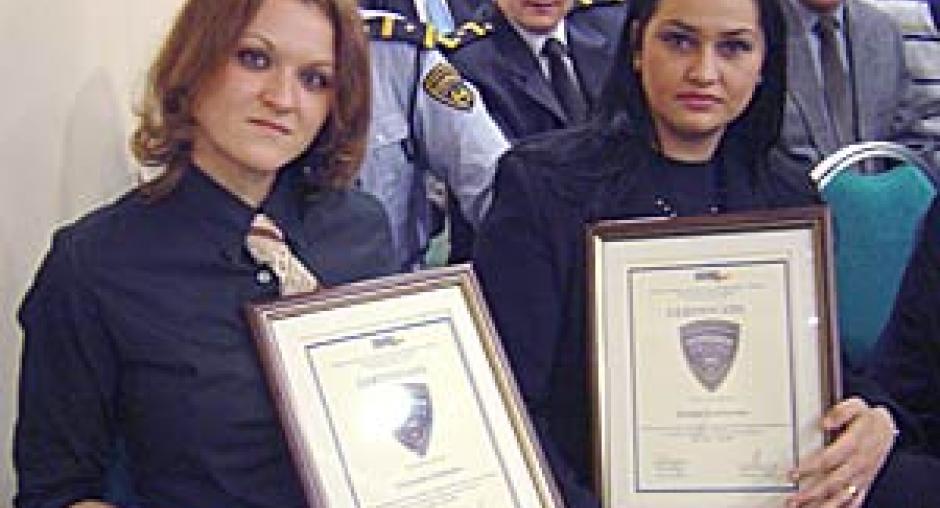Newsroom
OSCE Mission sends 32 community policing officers to gain hands-on experience in Holland
SKOPJE 19 January 2004

(OSCE)Police officers Biljana Stankovska and Cvetanka Zatovska display diplomas awarded for completing an OSCE training course in community policing in Ohrid, 18 January 2004. (OSCE) Photo details
SKOPJE, 19 January 2004 - Thirty-two police officers, men and women from a mix of ethnic backgrounds, have been awarded diplomas for completing an OSCE training course on community policing and will now be sent on a week-long visit to the Netherlands to experience how community policing is done in that country.
"You are now at the forefront of community policing in this country and on your shoulders rests the community policing of tomorrow", said David Tingle, Head of the Mission's Police Development Unit, at the award ceremony.
"Police officers like you will play a crucial role in spreading the principles of community policing throughout the police forces in the country, as you will be in charge of training your colleagues upon returning to your own police station", he added.
The OSCE Spillover Monitor Mission to Skopje, in co-operation with the Ministry of the Interior, recently concluded the training in community policing for the 32 specially selected middle-ranking police officers. The course was based on a specific curriculum developed by the OSCE for the country. The Swiss Government generously contributed to this training.
It included assessment and goal development; communications and confidence building; conflict resolution and mediation skills; partnership and meeting facilitation skills and developing multi-media skills.
"The best part was the communications training, given in part by the spokesperson of the ministry and OSCE media trainers", said Emzi Kurto, a police officer of ethnic Roma origin.
"The goal was also to enable the future coordinators to liaise between the local community and the media", confirmed General Borko Markovski, Head of Uniformed Police in the Public Security Bureau of the Ministry of Interior. "In order to achieve confidence between the population and the police, this group is expected to contribute to establishing a firm connection to the community".
This last session concluded the in-country part of the training. The Community relations coordinators are now preparing to leave for Holland at the beginning of February for their one-week trip, sponsored by the Dutch Government, where they will experience community policing in practice.
"You are now at the forefront of community policing in this country and on your shoulders rests the community policing of tomorrow", said David Tingle, Head of the Mission's Police Development Unit, at the award ceremony.
"Police officers like you will play a crucial role in spreading the principles of community policing throughout the police forces in the country, as you will be in charge of training your colleagues upon returning to your own police station", he added.
The OSCE Spillover Monitor Mission to Skopje, in co-operation with the Ministry of the Interior, recently concluded the training in community policing for the 32 specially selected middle-ranking police officers. The course was based on a specific curriculum developed by the OSCE for the country. The Swiss Government generously contributed to this training.
It included assessment and goal development; communications and confidence building; conflict resolution and mediation skills; partnership and meeting facilitation skills and developing multi-media skills.
"The best part was the communications training, given in part by the spokesperson of the ministry and OSCE media trainers", said Emzi Kurto, a police officer of ethnic Roma origin.
"The goal was also to enable the future coordinators to liaise between the local community and the media", confirmed General Borko Markovski, Head of Uniformed Police in the Public Security Bureau of the Ministry of Interior. "In order to achieve confidence between the population and the police, this group is expected to contribute to establishing a firm connection to the community".
This last session concluded the in-country part of the training. The Community relations coordinators are now preparing to leave for Holland at the beginning of February for their one-week trip, sponsored by the Dutch Government, where they will experience community policing in practice.
